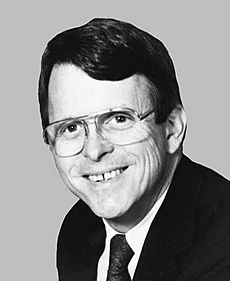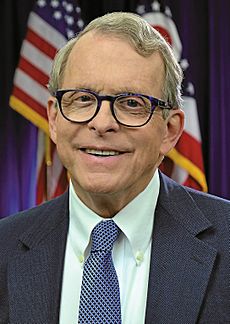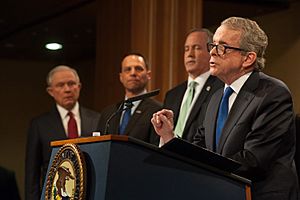Mike DeWine facts for kids
Quick facts for kids
Mike DeWine
|
|
|---|---|
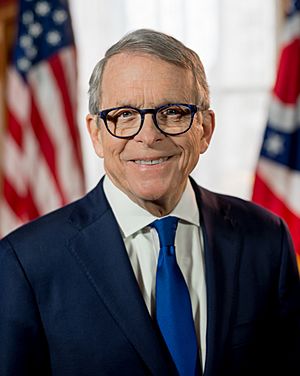
Official portrait, 2018
|
|
| 70th Governor of Ohio | |
| Assumed office January 14, 2019 |
|
| Lieutenant | Jon Husted Jim Tressel |
| Preceded by | John Kasich |
| 50th Attorney General of Ohio | |
| In office January 10, 2011 – January 14, 2019 |
|
| Governor | John Kasich |
| Preceded by | Richard Cordray |
| Succeeded by | Dave Yost |
| United States Senator from Ohio |
|
| In office January 3, 1995 – January 3, 2007 |
|
| Preceded by | Howard Metzenbaum |
| Succeeded by | Sherrod Brown |
| 59th Lieutenant Governor of Ohio | |
| In office January 14, 1991 – November 12, 1994 |
|
| Governor | George Voinovich |
| Preceded by | Paul Leonard |
| Succeeded by | Nancy Hollister |
| Member of the U.S. House of Representatives from Ohio's 7th district |
|
| In office January 3, 1983 – January 3, 1991 |
|
| Preceded by | Bud Brown |
| Succeeded by | Dave Hobson |
| Member of the Ohio Senate from the 10th district |
|
| In office January 2, 1981 – December 13, 1982 |
|
| Preceded by | John Mahoney |
| Succeeded by | Dave Hobson |
| Prosecutor of Greene County | |
| In office 1977–1981 |
|
| Preceded by | Nicholas Carrera |
| Succeeded by | William Schenck |
| Personal details | |
| Born |
Richard Michael DeWine
January 5, 1947 Springfield, Ohio, U.S. |
| Political party | Republican |
| Spouse |
Frances Struewing
(m. 1967) |
| Children | 8, including Pat |
| Education | Miami University (BA) Ohio Northern University (JD) |
Mike DeWine (born January 5, 1947) is an American politician and lawyer. He has been the 70th Governor of Ohio since 2019. He is a member of the Republican Party.
Before becoming governor, DeWine held many important roles. He was the 50th Attorney General of Ohio from 2011 to 2019. He also served in the U.S. House of Representatives from 1983 to 1991. Later, he was a U.S. Senator from 1995 to 2007.
DeWine grew up in Yellow Springs, Ohio. He went to Miami University and then to Ohio Northern University College of Law. After law school, he started his career as a prosecutor. He then moved into state and national politics.
Contents
Early Life and Education
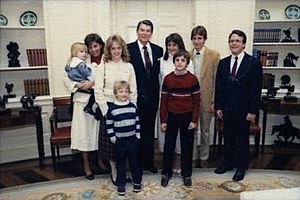
Mike DeWine was born and grew up in Yellow Springs, Ohio. His parents are Jean Ruth (Liddle) and Richard Lee DeWine. He is of Irish background and is a Roman Catholic.
He earned his first degree in education from Miami University in Oxford, Ohio, in 1969. Later, he earned a law degree from Ohio Northern University College of Law in 1972.
Early Political Career
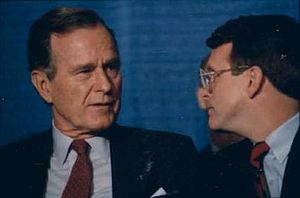
At 25, DeWine began his career as an assistant prosecutor for Greene County, Ohio. In 1976, he was elected as the County Prosecutor and served for four years. In 1980, he was elected to the Ohio State Senate and served one two-year term.
Serving in the U.S. House of Representatives
In 1982, Mike DeWine won the election to represent Ohio's 7th congressional district in the United States House of Representatives. He was reelected three more times. This district included his hometown of Springfield and parts of the Columbus suburbs.
Lieutenant Governor of Ohio
In 1990, DeWine decided not to run for the U.S. House again. Instead, he ran for lieutenant governor of Ohio with George Voinovich as his running mate. Their team won the election easily.
In 1992, DeWine ran for the United States Senate but did not win. He ran against the famous former astronaut, John Glenn.
U.S. Senate Service
In 1994, DeWine ran for the Senate again and won. He defeated Joel Hyatt by a large margin. He was reelected in 2000. During his time in the Senate, he worked on important committees like the Judiciary Committee. He also helped create a group of senators from both parties called the "Gang of 14." This group worked together to find solutions on tough issues.
In 2006, DeWine ran for reelection to the Senate but lost to Sherrod Brown.
Time Outside of Government
After leaving the Senate in 2007, Mike DeWine taught government classes at several universities. These included Cedarville University, Ohio Northern University, and Miami University. He also worked at a law firm.
Ohio Attorney General
In 2009, DeWine announced he would run for Ohio Attorney General. He won the election in 2010, becoming the 50th Attorney General of Ohio. He served in this role from 2011 to 2019.
Protecting Ohio Families
As Attorney General, DeWine focused on keeping Ohio families safe. He worked to speed up DNA testing for criminal investigations. This helped police solve crimes faster.
..... This led to many DNA matches and helped identify hundreds of alleged criminals.
DeWine also created the Crimes Against Children Initiative. This program helps investigate and prosecute people who harm children. .....
Columbus Crew Soccer Team Lawsuit
In 2017, there were talks about moving the Columbus Crew soccer team out of Ohio. Ohio has a law that says professional sports teams that have received public money must allow local owners to buy the team before moving. DeWine filed a lawsuit to make sure this law was followed. This helped lead to a deal that kept the team in Columbus.
Governor of Ohio

In 2016, Mike DeWine announced he would run for governor of Ohio. He won the Republican primary in 2018 and then won the general election to become governor.
Key Actions as Governor
- Public Safety: After a shooting in Dayton in 2019, DeWine asked the Ohio legislature to pass new laws to help prevent gun violence. He proposed ideas like expanding background checks for buying guns.
- COVID-19 Response: In early 2020, DeWine gained national attention for his quick response to the COVID-19 pandemic. He ordered the closing of dine-in restaurants and sporting events early on. He also directed more help to care facilities for older people. Many saw his actions as a guide for other states.
- Support for Ukraine: In 2022, during the 2022 Russian invasion of Ukraine, DeWine showed strong support for Ukraine. He banned the sale of Russian vodka in Ohio and declared a "Day of Prayer for the People of Ukraine." He also worked on plans to help Ukrainian citizens who might need to resettle in Ohio.
- East Palestine Train Derailment: In 2023, after a train derailment in East Palestine, Ohio, DeWine sent the Ohio National Guard to help. He announced financial aid for businesses and continued monitoring of air, water, and soil quality in the area.
- Return to Office for State Employees: In February 2025, Governor DeWine issued an order requiring state employees to return to working in the office full-time. He explained that many private companies were also bringing employees back to the office.
Political Views
Fair Voting Maps
In 2021, DeWine signed a new map for voting districts. This map was seen as favoring Republicans. Voting rights groups asked him to veto the map. In 2018, Ohio voters had approved changes to make redistricting more bipartisan. DeWine had promised to respect the voters' wishes.
LGBT Rights
DeWine has stated his opposition to same-sex marriage. He supported a change to the U.S. Constitution that would have prevented same-sex marriage. He argued in the Supreme Court that states should not have to recognize same-sex marriages from other states. The Supreme Court later ruled that bans on same-sex marriage were unconstitutional.
In 2021, DeWine opposed a bill that would have stopped transgender athletes from playing on sports teams that do not match their sex at birth. He believed this issue should be handled by sports leagues and associations, not by the government.
Internet Rules
As Attorney General, DeWine did not join lawsuits that many other states filed. These lawsuits were against changes to Net neutrality rules. These rules help ensure fair access to the internet for everyone.
Other Policies
In 2020, DeWine signed a bill that prevents colleges and universities in Ohio from blocking controversial speakers. In 2020, his salary as governor was $159,189.
Personal Life
Mike DeWine is married to Frances Struewing. They were married on June 3, 1967, and have eight children. Sadly, their daughter Rebecca passed away in a car accident at age 22. One of their sons, Pat DeWine, is a Justice on the Ohio Supreme Court. Another son, Brian, is the president of the Minor League Baseball team, the Asheville Tourists.
Images for kids
See also
 In Spanish: Mike DeWine para niños
In Spanish: Mike DeWine para niños
 | Lonnie Johnson |
 | Granville Woods |
 | Lewis Howard Latimer |
 | James West |


